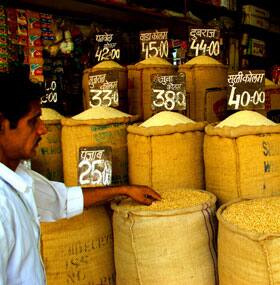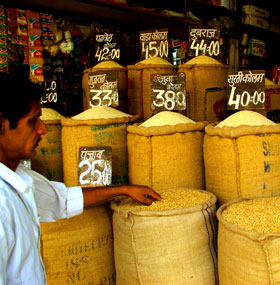New Delhi: The Food Ministry is likely to send the draft National Food Security Bill to the Law Ministry next week for vetting after incorporating some changes suggested by the state governments and other stakeholders. “We have received the comments from the state governments on the draft Food Bill circulated by our ministry. We are making certain changes in the draft Bill, after which it will be sent to the Law Ministry for vetting,” Food Secretary BC Gupta told PTI. [caption id=“attachment_123463” align=“alignleft” width=“380” caption=“The key changes include the insertion of the word ‘minimum’ with respect to entitlements under the proposed Bill, so that the government has the option to supply more than 3 kg of subsidised foodgrain per month. Reuters”]
 [/caption] Food Minister KV Thomas had recently announced that his ministry was targeting Cabinet clearance for the Bill by 20 November, following which it would be introduced in the Winter Session of Parliament, which starts on 22 November. Last week, Thomas held discussions with UPA Chairperson Sonia Gandhi about the proposed changes that would be made in the draft Bill. Gupta noted that the changes will benefit ‘general households’ and special category people like pregnant and lactating women. The key changes include the insertion of the word ‘minimum’ with respect to entitlements under the proposed Bill, so that the government has the option to supply more than 3 kg of subsidised foodgrain per month per person falling under ‘general households’ category if the country’s foodgrain output increases. The existing provisions of the draft Bill limit the government to supply of only 3 kilograms of rice and wheat to ‘general households’ at a price not exceeding 50 percent of the minimum support price (MSP). The draft Bill seeks to provide a legal entitlement to subsidised foodgrains to 75 percent of the country’s rural population and 50 percent of urban India. The beneficiaries are divided into ‘priority’ (below poverty line) and ‘general’ (above poverty line) households. The other changes include removal of the condition of extending benefits to ‘general households’ only in states where the Public Distribution System (PDS) is modernised. The present draft restricts the benefit for general households in states that have modernised the PDS. Now, the benefit will be extended to all states. Furthermore, the cash incentives of Rs 1,000/month for six months to pregnant and lactating women will now be extended to the entire country, instead of just 52 districts. The proposed Bill would cost the government exchequer more than Rs 1,00,000 crore annually in subsidies. PTI
[/caption] Food Minister KV Thomas had recently announced that his ministry was targeting Cabinet clearance for the Bill by 20 November, following which it would be introduced in the Winter Session of Parliament, which starts on 22 November. Last week, Thomas held discussions with UPA Chairperson Sonia Gandhi about the proposed changes that would be made in the draft Bill. Gupta noted that the changes will benefit ‘general households’ and special category people like pregnant and lactating women. The key changes include the insertion of the word ‘minimum’ with respect to entitlements under the proposed Bill, so that the government has the option to supply more than 3 kg of subsidised foodgrain per month per person falling under ‘general households’ category if the country’s foodgrain output increases. The existing provisions of the draft Bill limit the government to supply of only 3 kilograms of rice and wheat to ‘general households’ at a price not exceeding 50 percent of the minimum support price (MSP). The draft Bill seeks to provide a legal entitlement to subsidised foodgrains to 75 percent of the country’s rural population and 50 percent of urban India. The beneficiaries are divided into ‘priority’ (below poverty line) and ‘general’ (above poverty line) households. The other changes include removal of the condition of extending benefits to ‘general households’ only in states where the Public Distribution System (PDS) is modernised. The present draft restricts the benefit for general households in states that have modernised the PDS. Now, the benefit will be extended to all states. Furthermore, the cash incentives of Rs 1,000/month for six months to pregnant and lactating women will now be extended to the entire country, instead of just 52 districts. The proposed Bill would cost the government exchequer more than Rs 1,00,000 crore annually in subsidies. PTI
Food ministry to send Food Security Bill for vetting next week
FP Archives
• November 4, 2011, 14:15:19 IST
The Food Ministry is likely to send the draft National Food Security Bill to the Law Ministry next week for vetting after incorporating some changes suggested by the state governments and other stakeholders.
Advertisement
)